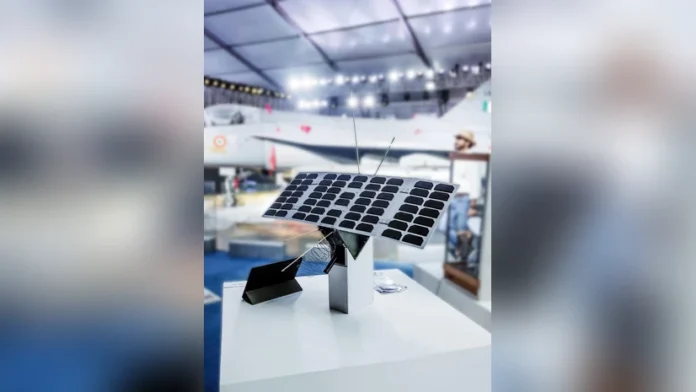Xovian Aerospace Secures $2.5M to Pioneer AI-Native RF Satellite Infrastructure
Bengaluru, India — In a significant boost for India’s burgeoning spacetech ecosystem, Xovian Aerospace has announced that it has raised $2.5 million in a pre-seed funding round led by Piper Serica and Turbostart, with additional participation from Inflection Point Ventures (IPV) and Eaglewings Ventures.
The investment marks a crucial milestone for the young startup, which is aiming to launch the world’s first AI-native radio frequency (RF) satellite infrastructure — a cutting-edge approach that could transform the way space-based sensing, monitoring, and communication systems operate.
A Leap Forward for India’s Spacetech Ambitions
Over the past decade, India has transitioned from being primarily a government-driven space nation — with ISRO at the helm — to a vibrant ecosystem where private companies are building commercial spacecraft, satellite constellations, and advanced payload systems.
Xovian Aerospace’s vision is firmly aligned with this new wave of innovation. The startup is developing AI-native multi-frequency RF payloads designed to be more adaptable, responsive, and autonomous than traditional systems. By embedding artificial intelligence directly into the sensing architecture, these satellites can process vast amounts of RF data in real-time, enabling faster decision-making and more precise analytics for industries such as:
- Maritime surveillance
- Aviation traffic monitoring
- Disaster management
- Spectrum intelligence and monitoring
- Defence reconnaissance
If successful, Xovian’s technology could position India at the forefront of a niche yet highly strategic global market.
The Funding Round and Strategic Investors
The $2.5 million pre-seed round was not only about securing capital — it also brought on board investors with diverse backgrounds in technology scaling, deeptech incubation, and early-stage mentorship.
- Piper Serica: Known for supporting high-growth Indian startups, Piper Serica’s participation brings strategic guidance on scaling operations in both domestic and international markets.
- Turbostart: An accelerator and venture platform that focuses on startups with disruptive potential, Turbostart’s involvement underscores the transformative promise of AI-native satellite infrastructure.
- Inflection Point Ventures (IPV): One of India’s most active angel investing platforms, IPV’s network and resources will support Xovian in talent acquisition and go-to-market strategy.
- Eaglewings Ventures: With expertise in deeptech investments, Eaglewings strengthens Xovian’s ability to navigate complex technological and regulatory landscapes.
For a pre-seed round, the $2.5M figure is notable in India’s spacetech sector — an industry where capital intensity is high, and early-stage investors must have deep conviction in the technical and market feasibility.
Xovian’s Maiden Mission: An Indigenous RF Payload on ISRO’s Launch Vehicle
With the newly raised funds, Xovian Aerospace is preparing for its maiden spacecraft launch, which will feature a multi-frequency RF payload aboard an ISRO launch vehicle. The mission is aimed at validating the company’s indigenously developed core sensing technology.
By the end of this year, Xovian plans to conduct space trials, putting its AI-native RF payload through real-world orbital testing. If the validation phase succeeds, it will serve as a proof point for the startup’s claim that AI-native sensing can outperform conventional payload systems in flexibility, responsiveness, and operational efficiency.
What Makes an AI-Native RF Satellite Different?
While RF (radio frequency) satellites are not new, the AI-native designation represents a major paradigm shift. Traditionally, satellite payloads collect data in raw form and transmit it to ground stations for analysis. This process often introduces delays and requires heavy reliance on earth-based infrastructure.
An AI-native system integrates machine learning algorithms directly into the satellite’s onboard processing units, allowing:
- Real-Time Decision Making
Data can be analyzed as it’s collected, enabling faster response times for applications like search and rescue or defence alerts. - Bandwidth Optimization
Instead of sending terabytes of raw data, the satellite can transmit only relevant, filtered, or pre-analyzed information, reducing transmission costs and improving efficiency. - Adaptive Mission Profiles
AI can dynamically adjust the payload’s scanning modes or frequency bands based on situational needs, such as detecting interference, tracking vessels, or monitoring emergencies. - Autonomous Operations
In scenarios where communication with ground stations is limited, AI-native satellites can continue mission-critical tasks without manual intervention.
This approach mirrors broader trends in autonomous systems, where computational intelligence is embedded at the source of data collection rather than downstream.
Global Context: Why RF Satellites Are Strategic
The global satellite communications and sensing market is undergoing rapid transformation. RF satellites, in particular, are indispensable for monitoring electromagnetic spectrum activity across regions — a capability critical for national security, regulatory compliance, and commercial operations.
Countries and companies are racing to secure leadership in this area for several reasons:
- Geopolitical Significance: Control over spectrum intelligence can provide strategic military and diplomatic advantages.
- Commercial Demand: The rise in autonomous shipping, drone logistics, and connected aviation creates a growing need for persistent RF monitoring.
- Spectrum Management: With 5G, satellite broadband, and IoT networks expanding, spectrum congestion and interference detection are becoming global priorities.
By focusing on AI-native RF infrastructure, Xovian is entering a competitive yet underdeveloped niche, where innovation could lead to defensible IP and high-value contracts.
India’s Private Space Ecosystem: A Rising Tide
Xovian’s journey is part of a larger trend where Indian spacetech startups are attracting significant investor interest. Following the 2023 Indian Space Policy, which opened more opportunities for private participation, companies like Agnikul Cosmos, Skyroot Aerospace, Pixxel, and Dhruva Space have secured multimillion-dollar rounds and international partnerships.
The success of Chandrayaan-3 and the upcoming Gaganyaan mission have boosted both public interest and investor confidence in Indian space capabilities. Government-backed initiatives, including IN-SPACe, are providing a regulatory framework for startups to collaborate with ISRO facilities and resources.
In this ecosystem, Xovian’s AI-native RF approach represents a deeptech frontier — blending satellite engineering, artificial intelligence, and spectrum intelligence into a unified value proposition.
Investor Perspectives on Xovian’s Potential
Early backers believe Xovian is poised to fill a critical gap in the market. A spokesperson from Piper Serica noted:
“Xovian Aerospace’s AI-native approach represents the kind of deeptech innovation that can put India on the map for next-generation satellite infrastructure. We are confident in their ability to execute and scale.”
Turbostart’s leadership highlighted the dual benefit of the technology — commercial scalability and strategic relevance:
“The fusion of AI and RF sensing has transformative potential not just for industry, but also for national security. Xovian’s vision aligns with the needs of tomorrow’s connected world.”
Such investor endorsements indicate that beyond the immediate mission, Xovian may be laying the foundation for a long-term platform business in spectrum intelligence and AI-driven satellite analytics.
Technical Challenges and Road Ahead
While the prospects are promising, developing AI-native RF satellites is a formidable challenge. The hurdles include:
- Onboard Processing Power: Space-qualified processors must balance performance with radiation tolerance.
- Algorithm Optimization: AI models must be lightweight enough to run efficiently in space hardware, yet robust enough for complex pattern recognition.
- Thermal and Power Management: AI workloads can be power-intensive, requiring efficient energy management in the satellite.
- Regulatory Approvals: RF operations must comply with national and international spectrum allocation laws.
- Launch Logistics: Coordinating payload integration with ISRO’s launch schedule and technical specifications is a non-trivial task.
Overcoming these obstacles will require a combination of engineering ingenuity, disciplined project management, and continued investor support.
Beyond the First Launch: Scaling Up
Xovian Aerospace has indicated that post-validation, the funding will also be used to expand capacity and scale engineering teams. The startup plans to hire specialists in:
- RF systems engineering
- AI model deployment in edge environments
- Satellite mission design
- Data analytics for spectrum intelligence
The company is also exploring partnerships with international agencies and commercial operators who could benefit from AI-native RF capabilities in their constellations.
Potential Market Applications
If Xovian’s maiden mission proves successful, its technology could find applications across multiple sectors:
- Defence and Intelligence
Persistent RF surveillance for border security, maritime domain awareness, and signals intelligence. - Aviation Safety
Tracking and monitoring air traffic, especially in regions with limited radar coverage. - Maritime Operations
Monitoring illegal fishing, piracy, and vessel compliance with international laws. - Disaster Response
Rapid situational awareness during natural disasters, enabling targeted deployment of rescue resources. - Telecom and Spectrum Management
Identifying and mitigating interference in congested frequency bands.
Given the global demand for these capabilities, Xovian could potentially serve both domestic and international clients.
Positioning for Global Competitiveness
Globally, companies like HawkEye 360 (US), Unseenlabs (France), and Kleos Space (Luxembourg) are already operating commercial RF monitoring constellations. However, Xovian’s AI-native differentiation could allow it to leapfrog some incumbents by offering faster, smarter, and more autonomous data products.
In addition, being based in India offers cost advantages in engineering talent and launch services, potentially enabling more competitive pricing for customers.



